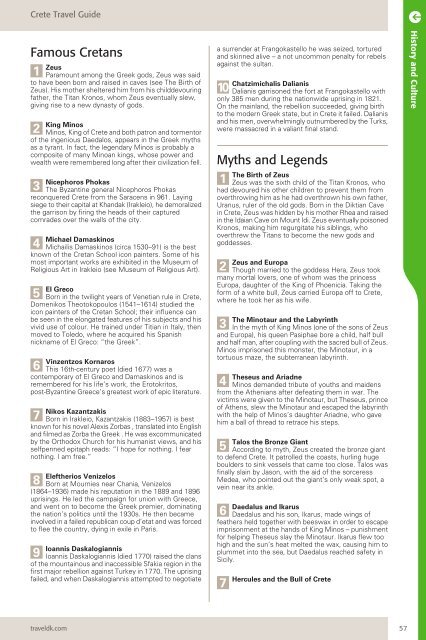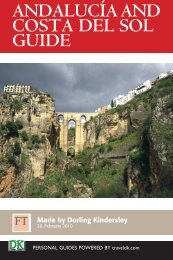CRETE TRAVEL GUIDE
CRETE TRAVEL GUIDE
CRETE TRAVEL GUIDE
Create successful ePaper yourself
Turn your PDF publications into a flip-book with our unique Google optimized e-Paper software.
Crete Travel Guide<br />
Famous Cretans<br />
1 Zeus<br />
Paramount among the Greek gods, Zeus was said<br />
to have been born and raised in caves (see The Birth of<br />
Zeus). His mother sheltered him from his childdevouring<br />
father, the Titan Kronos, whom Zeus eventually slew,<br />
giving rise to a new dynasty of gods.<br />
2<br />
King Minos<br />
Minos, King of Crete and both patron and tormentor<br />
of the ingenious Daedalos, appears in the Greek myths<br />
as a tyrant. In fact, the legendary Minos is probably a<br />
composite of many Minoan kings, whose power and<br />
wealth were remembered long after their civilization fell.<br />
3<br />
Nicephoros Phokas<br />
The Byzantine general Nicephoros Phokas<br />
reconquered Crete from the Saracens in 961. Laying<br />
siege to their capital at Khandak (Irakleio), he demoralized<br />
the garrison by firing the heads of their captured<br />
comrades over the walls of the city.<br />
4<br />
Michael Damaskinos<br />
Michailis Damaskinos (circa 1530–91) is the best<br />
known of the Cretan School icon painters. Some of his<br />
most important works are exhibited in the Museum of<br />
Religious Art in Irakleio (see Museum of Religious Art).<br />
5<br />
El Greco<br />
Born in the twilight years of Venetian rule in Crete,<br />
Domenikos Theotokopoulos (1541–1614) studied the<br />
icon painters of the Cretan School; their influence can<br />
be seen in the elongated features of his subjects and his<br />
vivid use of colour. He trained under Titian in Italy, then<br />
moved to Toledo, where he acquired his Spanish<br />
nickname of El Greco: “the Greek”.<br />
6<br />
Vinzentzos Kornaros<br />
This 16th-century poet (died 1677) was a<br />
contemporary of El Greco and Damaskinos and is<br />
remembered for his life’s work, the Erotokritos,<br />
post-Byzantine Greece’s greatest work of epic literature.<br />
7<br />
Nikos Kazantzakis<br />
Born in Irakleio, Kazantzakis (1883–1957) is best<br />
known for his novel Alexis Zorbas , translated into English<br />
and filmed as Zorba the Greek . He was excommunicated<br />
by the Orthodox Church for his humanist views, and his<br />
selfpenned epitaph reads: “I hope for nothing. I fear<br />
nothing. I am free.”<br />
8<br />
Eleftherios Venizelos<br />
Born at Mournies near Chania, Venizelos<br />
(1864–1936) made his reputation in the 1889 and 1896<br />
uprisings. He led the campaign for union with Greece,<br />
and went on to become the Greek premier, dominating<br />
the nation’s politics until the 1930s. He then became<br />
involved in a failed republican coup d’etat and was forced<br />
to flee the country, dying in exile in Paris.<br />
9<br />
Ioannis Daskalogiannis<br />
Ioannis Daskalogiannis (died 1770) raised the clans<br />
of the mountainous and inaccessible Sfakia region in the<br />
first major rebellion against Turkey in 1770. The uprising<br />
failed, and when Daskalogiannis attempted to negotiate<br />
traveldk.com<br />
a surrender at Frangokastello he was seized, tortured<br />
and skinned alive – a not uncommon penalty for rebels<br />
against the sultan.<br />
10<br />
Chatzimichalis Dalianis<br />
Dalianis garrisoned the fort at Frangokastello with<br />
only 385 men during the nationwide uprising in 1821.<br />
On the mainland, the rebellion succeeded, giving birth<br />
to the modern Greek state, but in Crete it failed. Dalianis<br />
and his men, overwhelmingly outnumbered by the Turks,<br />
were massacred in a valiant final stand.<br />
Myths and Legends<br />
1<br />
The Birth of Zeus<br />
Zeus was the sixth child of the Titan Kronos, who<br />
had devoured his other children to prevent them from<br />
overthrowing him as he had overthrown his own father,<br />
Uranus, ruler of the old gods. Born in the Diktian Cave<br />
in Crete, Zeus was hidden by his mother Rhea and raised<br />
in the Idaian Cave on Mount Idi. Zeus eventually poisoned<br />
Kronos, making him regurgitate his siblings, who<br />
overthrew the Titans to become the new gods and<br />
goddesses.<br />
2<br />
Zeus and Europa<br />
Though married to the goddess Hera, Zeus took<br />
many mortal lovers, one of whom was the princess<br />
Europa, daughter of the King of Phoenicia. Taking the<br />
form of a white bull, Zeus carried Europa off to Crete,<br />
where he took her as his wife.<br />
3<br />
The Minotaur and the Labyrinth<br />
In the myth of King Minos (one of the sons of Zeus<br />
and Europa), his queen Pasiphae bore a child, half bull<br />
and half man, after coupling with the sacred bull of Zeus.<br />
Minos imprisoned this monster, the Minotaur, in a<br />
tortuous maze, the subterranean labyrinth.<br />
4<br />
Theseus and Ariadne<br />
Minos demanded tribute of youths and maidens<br />
from the Athenians after defeating them in war. The<br />
victims were given to the Minotaur, but Theseus, prince<br />
of Athens, slew the Minotaur and escaped the labyrinth<br />
with the help of Minos’s daughter Ariadne, who gave<br />
him a ball of thread to retrace his steps.<br />
5<br />
Talos the Bronze Giant<br />
According to myth, Zeus created the bronze giant<br />
to defend Crete. It patrolled the coasts, hurling huge<br />
boulders to sink vessels that came too close. Talos was<br />
finally slain by Jason, with the aid of the sorceress<br />
Medea, who pointed out the giant’s only weak spot, a<br />
vein near its ankle.<br />
6<br />
Daedalus and Ikarus<br />
Daedalus and his son, Ikarus, made wings of<br />
feathers held together with beeswax in order to escape<br />
imprisonment at the hands of King Minos – punishment<br />
for helping Theseus slay the Minotaur. Ikarus flew too<br />
high and the sun’s heat melted the wax, causing him to<br />
plummet into the sea, but Daedalus reached safety in<br />
Sicily.<br />
7<br />
Hercules and the Bull of Crete<br />
57<br />
History and Culture
















